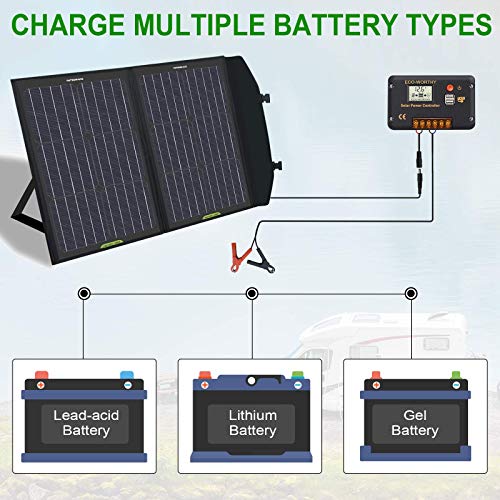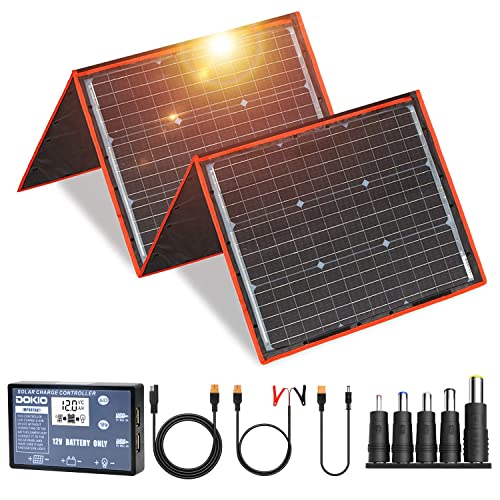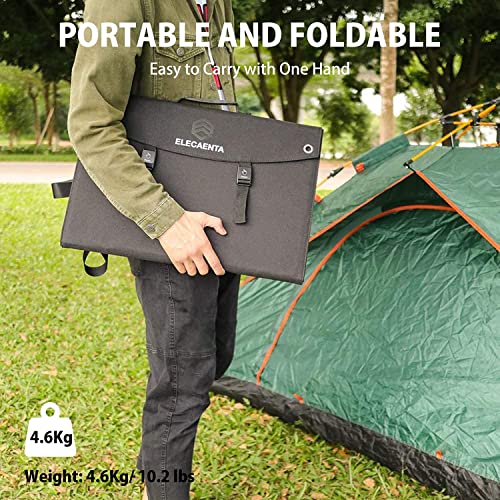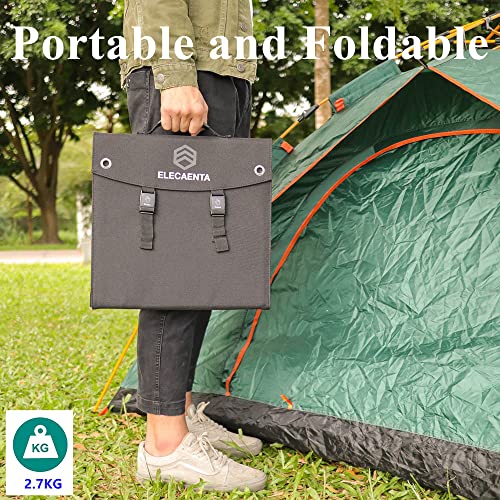If you’re like most people, you probably have a few different types of heaters in your home. But did you know that you could save money by using solar panels to power your heaters?
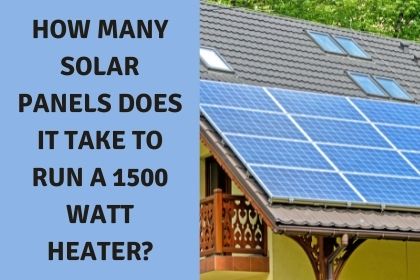
Heaters are a useful device to have in any home, especially if you live in a chilly climate. While they are required, heaters might also significantly influence your electricity bill. This may be disheartening, and it has even prevented some people from adding heating systems or eliminating existing ones.
So, what are your options? And how can you install a heater without breaking the bank? The solution is as obvious as it is effective: solar panels.
Solar panels allow you to convert solar energy into electricity that can be used in different places, such as ‘heating your home’, and they don’t burn or require maintenance. Because heaters consume a significant amount of power, you will probably need more than one solar panel to run your heater.
The key question becomes, ‘how many solar panels do you need for a 1500 watt heater?’ Once you’ve figured this out, you’ll never have to worry about huge electric expenses again.
Number of Solar Panels Needed For a 1500 Watt Heater
To understand the number of solar panels required for a 1500 watt heater, we’ll need to do some math. The good news is that whether or not you have a strong mathematical background, you will still be able to figure out what you’ll require for a 1500 watt heater.
Solar panels are sized according to the wattage they generate, so the number of solar panels you’ll need is determined by the wattage of your solar panel.
So, for example, a 500-watt solar panel would require three solar panels (1500/500) to run a 1500 watt heater. By the same logic, if you’re getting a 300-watt solar panel, you’ll need five of them.
The following is the formula for determining how many solar panels are necessary:
[total wattage of the water heater (1500) / total wattage of the solar panel (500 or 300 or 100)]
The equation is straightforward, and it can be used for any wattages of a heater or other devices you wish to connect to solar panels. You should also understand that although your heater requires 1500 watts of energy, your solar panels must produce all this energy and additional energy
The amount of extra energy you’ll need is determined by:
- The difference between the wattage your solar panel produces, and the wattage required to run the device (1500w)
So, if your solar panel produces 300 watts, you will need additional panels to generate 450 watts of power [1500 – 300 = 1100/300].
The number of solar panels you need to run your heater will therefore depend on the wattage produced by your panel. The more watts the panel produces, the fewer panels you’ll require. If your panel produces less than 1500 watts, however, you may need multiple ones.
With that in mind, a 1500 watt heater will need about 1800 watts worth of solar panels to operate. If you have a 300-watt panel, you’ll need five of them to run your heater. That’s the beauty of solar panels: they are extremely versatile and can be used for any number of applications.
How Much Money Will You Save By Powering A Heater With Solar Panels?
In general, most people like to know how much of their energy bill will be offset by solar panels and how much money will be saved.
If the energy bill is calculated using kilowatt-hours per hour, you’ll know how much you’ll be paying for each hour your heater is on. A 1500 watt heater uses 1.5 kilowatts every hour. Multiply the amount you get charged by your energy company by 1.5 to obtain the number of your power charges for a kilowatt per hour.
If the power company charges you £0.20 per kilowatt-hour, for example, you would multiply that by 1.5 to see how much your heater would be costing you on average. 0.3 is the result of 1.5*0.2= 0.3 (rounded off).
For every hour you use your heater, you’ll be paying £0.3 for power. If you run the heater every hour of the day, this will add up to a whopping £11 in electricity costs:
- 9 hours x £0.30 = £2.70
- 6 hours x £0.30 = £1.80
- 12 hours x £0.30 =£3.60
You will save about £11 each day if you use your heater for 9 hours during the day, 6 hours in the evening, and even more if you run it overnight
Of course, solar panels won’t fully offset all your power charges unless you use them 24/7. If you were to only power your heater for 9 hours during the day, you would only see around £2 in savings each day.
However, if you power your heater for every additional hour (which is easy if your solar panels face south), you’ll be able to offset all of your costs entirely.
Because the solar panels may operate all day without costing you extra, this is an excellent choice for heating your home.
How Many Heaters Can I Run Using Solar Power?
Depending on the size of your home, you may need to operate more than one heater. Solar energy is an infinite power source that can supply as much electricity as you require, even with many heaters.
If you want to power multiple heaters, you can do so easily with solar panels. The more heating appliances you use, the more panels you’ll need to install, but it’s easy to determine this amount using the previous formula.
The only thing that will change is the number of solar panels required to power the heaters.
If you know how many solar panels you’ll need, it’s simpler to figure out how many solar panels you’ll need to power several heaters. If you’re using two 1500-watt heaters, you’ll require enough solar panels to produce 3000 watts of energy.
It’s simple to determine how many panels you’ll require for any number or appliances or wattages by simply multiplying the number of appliances by 1500 and then dividing it by your solar panel’s wattage production.
For example, if you have six heaters that are each 1500 watts, you’ll need to buy enough solar panels to produce 90000 watts of power.
In some cases, the solar panels offset some of the cost of heating, but not all of it. The savings depend on the hourly cost of electricity in your area.
Do you need batteries with solar panels?
It isn’t mandatory, but it is highly recommended to run solar panels along with batteries. Batteries store energy for use when the sun isn’t shining.
You can save even more money by using batteries since you’ll be able to enjoy solar power all day, not just while the sun is out. Use solar power at night and on cloudy days by storing it in batteries.
This is especially useful if your home requires more than the energy that your solar panels are able to produce.
The number and capacity of the heaters you operate will determine the batteries’ capacity. For as long as you want, you may have constant heat for as long as your heater is on. The only time your heater won’t be switched on is if you manually turn it off. It is, nevertheless, suggested that you switch off your heater when not in use.
Solar panel installation is available in many places, and the process is very simple for any homeowner. The professional can determine how much power you’ll need based on your lifestyle and weather conditions. In most cases, it includes several panels that are installed directly on the roof or exterior walls of your home.
For 10 hours, you’ll need around 8000 watts of batteries. In a nutshell, you’ll need about four 2000 watt batteries. Alternatively, four 12V 120Ah batteries may be used instead. If you want the heater to work all day, however, you will need eight batteries.
When adding solar panels to your home, you’ll need to check if you need inverters as well as wires to connect the system together. If you require an inverter, it should be included in your installation; if not, this will be another expense you should consider.
If you have solar panels already installed that meet the heater’s needs, you may continue to use your existing batteries without having to buy new ones.
Reducing How Much Power a Heater Consumes?
There are several different options for reducing the power consumption of your heater. You may experiment with settings and see if it’s possible to adjust them without waste or damage to the heater.
Some ways to reduce your heater power consumption include:
- Adjust the Thermostat – If there is a temperature gauge, you can set it to a lower temperature or even turn it off when not in use. The coils inside the heating elements will stay hot for a while after they’ve been turned off. You should also consider turning off your heater when it’s not in use, or installing timers to turn it on and off at the times you want.
- Using the sun to warm your home: When the sun is out, you may notice that your home has a lot of natural warmth in the daytime. Rather than relying on a heater, you may allow the natural heat into your property and enjoy the warmth without having to worry about it.
- Insulating your house: You will need the heater most during the winter, when it is likely to be used frequently. However, using a heater all day may not keep you warm enough, especially if your home isn’t well-insulated. You won’t have to operate the heater all of the time because your house will be able to retain heat with optimal insulation. For the most part, you may use your heater when needed and not any more than that.
- Operating the Heater Less Often: A lot of people rely on their heaters to keep them warm, but this isn’t always necessary. For example, if it is sunny outside or you’re planning on going out for a while soon after arriving home , you won’t need to keep your heater on. Rather than leaving it on overnight, for example, you could turn it off and only use the heater when you need it.
- Using a smaller heater: A smaller heater will draw less power than a larger heater. A 1500w heater will require 1.5Kw of energy, and a 750w heater will require 0.75Kw of power. When your house is small, you won’t need a large heater and can install a small heater in a large home with proper optimization.
- Getting an efficient model: Some heater types are more energy efficient than others, and they consume less power than anticipated. As a result of their growing popularity, you may now purchase energy efficient heaters that are priced similarly to standard models. It may be worth it to you if the power difference is significant, and it’s important to know how much it will cost you before you purchase a model.
In addition to researching the power consumption of your heater, you should monitor its power consumption with your solar panels. If you’re adding solar panels, this is an important step to take as it will determine how effective they are.
FAQs
Are Batteries Required to Run Solar Powered Heaters?
The short answer is yes, while not mandatory, batteries are required to run solar-powered heaters.
Solar power systems operate on the principle of producing DC current, which is then converted to AC current, but this conversion requires electronic voltage converters. These converters are not only expensive but also require a certain number of batteries to operate.
If you are located in an area with extremely cold winters that require heaters, then it makes more sense to buy a solar heater rather than invest in the voltage converters and batteries necessary for powering your heater.
How Many Solar Panels Does It Need to Run a Heater?
The number of panels you need will depend on the solar panel wattage and the heater wattage. The solar wattage should be higher or equal to the heater wattage.
The number of panels you need will also depend on the voltage in your area. The power that is produced from a panel is proportional to the current, so the more volts you have, the fewer panels it takes to produce a certain amount of power.
How many batteries will a 100-watt solar panel charge?
A 100-watt solar panel can produce as much as 30Ah charge in 9 hours. The requirement of the batteries will determine how many can be charged.
If the batteries need each charge to be at least 20Ah, then a 100-watt solar panel can charge 2 of them. Solar panels are available in different sizes, so choosing the right size is important.
Final Thoughts
So, how many solar panels does it take to run a 1500 watt heater? Well, the answer depends on how much electricity you need.
If you’re going to be using your heater a lot more in the summer months than winter months, then it might be worth it to invest in a solar panel.
If you’re not planning on using your heater for more than a few hours each day, then it makes no sense to invest in a solar panel.


